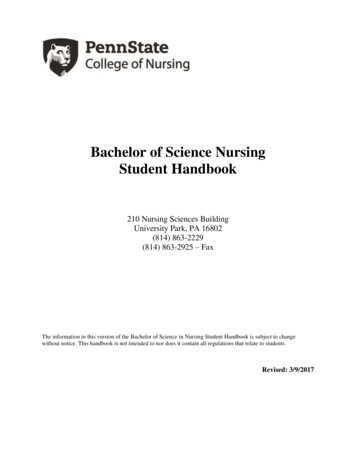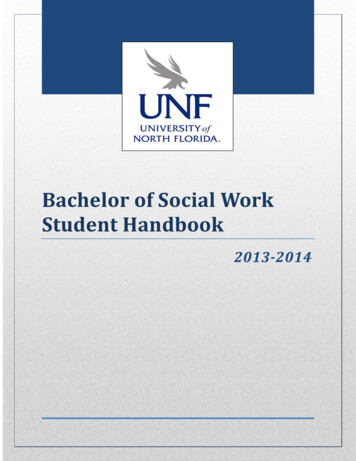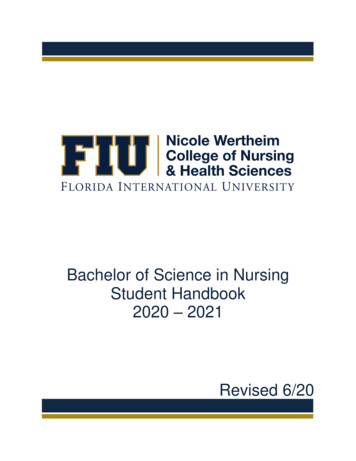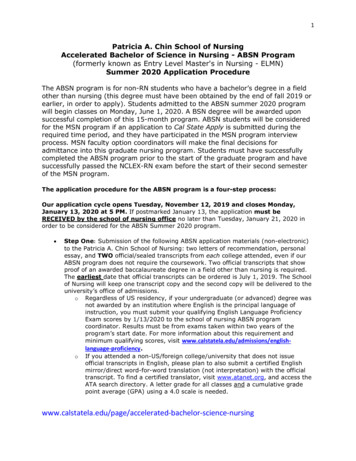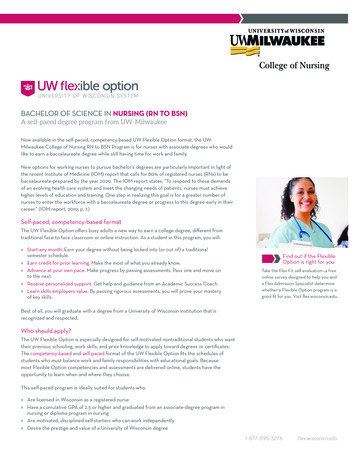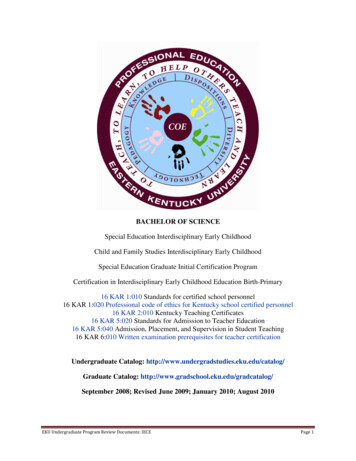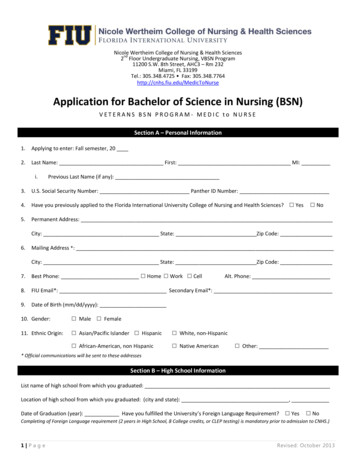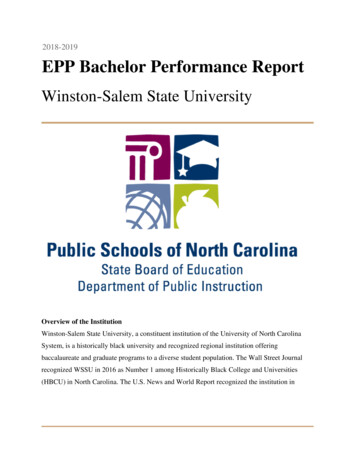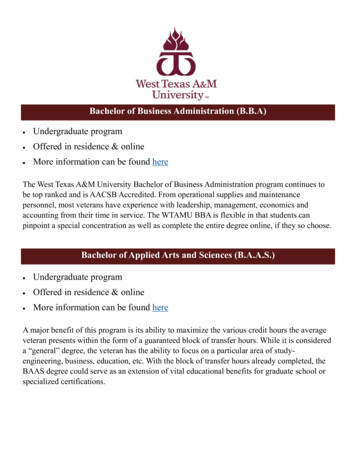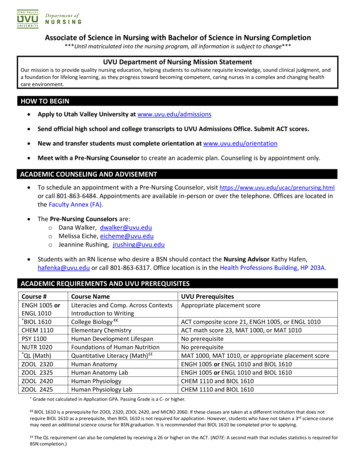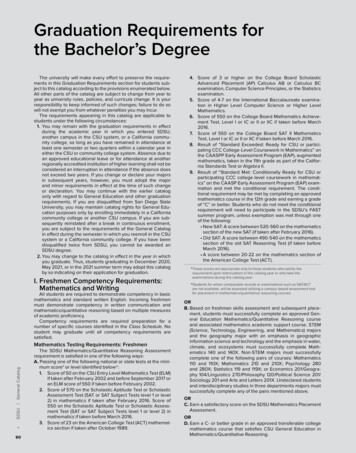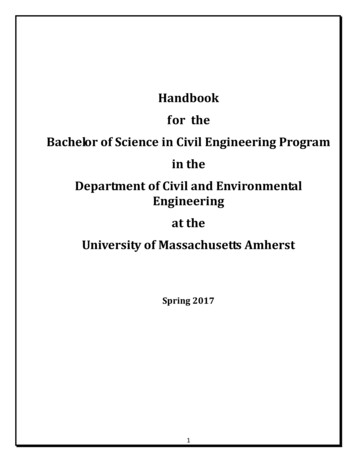
Transcription
Handbookfor theBachelor of Science in Civil Engineering Programin theDepartment of Civil and EnvironmentalEngineeringat theUniversity of Massachusetts AmherstSpring 20171
Table of ContentsPREFACE . 4THE CIVIL ENGINEERING PROGRAM AT UMASS . 4Department of Civil and Environmental Engineering Mission . 4CE Program Educational Objectives . 4The Civil Engineering Curriculum. 5GUIDANCE FOR COMPLETING THE CIVIL ENGINEERING PROGRAM. 6Advising Procedures In Civil Engineering . 6Tutoring . 7Course Descriptions . 7Progress Through the Curriculum – Flow Chart. 7Academic Honesty . 9REQUIREMENTS FOR GRADUATION WITH CIVIL ENGINEERING DEGREE . 9University General Education Requirements . 9Minimum Grade Point Average . 10Civil Engineering Electives . 11Engineering Science and Engineering Design . 11Design Electives . 11Free Elective . 11Requirements When Graduation Date Changes . 11ALTERNATE PATHS TO MEET REQUIREMENTS . 12Transfer Credit12Students Seeking a Second Bachelors Degree . 12Substitution For Civil Engineering Elective Courses . 12ADDITIONAL EDUCATIONAL OPPORTUNITIES . 132
Civil Engineering and The Commonwealth Honors College . 13Study Abroad And National Exchange . 13Internships And Co-Ops . 13Independent Study And Special Topics . 13Engineering Management Minor . 14Scholarship Opportunities . 14ACADEMIC REGULATIONS . 15Grading . 15Incomplete Grades . 16Pass/Fail Option . 16Academic Status . 16Course Enrollments and Withdrawals . 16Add Period . 16Drop Period . 17Auditing17APPENDIX A: CEE PREREQUISITE LIST . 18APPENDIX B: ENGINEERING SCIENCE AND DESIGN CONTENT. 20APPENDIX C: TRANSFER CREDIT DOCUMENTATION . 22APPENDIX D: COURSE SUBSTITUTION FORM . 23APPENDIX E: COMMONWEALTH HONORS COLLEGE . 24GENERAL STUDIES HONORS REQUIREMENTS . 24REQUIREMENTS FOR THOSE PURSING THE FULL HONORS COLLEGE CURRICULUM WITHDEPARTMENTAL HONORS* . 24APPENDIX F: STUDY ABROAD AND NATIONAL EXCHANGE . 27APPENDIX G: INDEPENDENT STUDY FORM. 293
PrefaceThe intent of this Handbook is to provide an overview of the undergraduate program in theDepartment of Civil and Environmental Engineering at the University of Massachusetts Amherst. TheHandbook describes the mission and objectives of the Department with regards to undergraduateeducation. The Handbook details the requirements that need to be fulfilled to receive a B.S. degree inCivil Engineering. The Handbook also provides details on Department policies, procedures, andrequirements for transferred courses, Honors program and other special opportunities that studentsmay pursue. This Handbook addresses specific rules and policies of the Department of Civil andEnvironmental Engineering and describes other College and University regulations. College andUniversity requirements not mentioned in this Handbook still apply to all students.The Civil Engineering Program at UMassDepartment of Civil and Environmental Engineering MissionThe mission of the Department of Civil and Environmental Engineering is: to educate students at theundergraduate and graduate levels; to conduct research to solve Civil Engineering problems and todiscover new knowledge; to offer service to the Commonwealth, the nation, and the Civil Engineeringprofession; and to develop Civil Engineering leaders.CE Program Educational ObjectivesThe Program Educational Objectives of the UMass Civil Engineering Program describe what graduatesare expected to attain in the years after graduation. They are:1.Within three to five years of graduation Program graduates will have become employed inengineering or a related profession or will have continued with graduate studies.2.Within three to five years of graduation Program graduates will have been recognized bysupervisors and colleagues as possessing the knowledge and skills needed for a successfulcareer in engineering or related field and will be progressing toward the appropriateprofessional license or credentials.3.Within five to ten years of graduation Program graduates will have demonstrated leadershipand service within their profession and in their communities through participation inprofessional societies and charitable organizations and similar civic service activities.4.Throughout their careers program graduates will use educational opportunities to continue toexpand their knowledge and skills in areas required for their career.4
The Civil Engineering CurriculumThe Department awards a Bachelor of Science Degree in Civil Engineering. The degree is accreditedby the Engineering Accreditation Commission of ABET, http://www.abet.org, and the curriculumincludes a mixture of humanities, social science, physical science, communications, andengineering courses. Figure 1 shows the full curriculum with the typical semester is which eachcourse is taken. Many of the basic science and engineering courses are taken in the first twoyears, followed by engineering courses in the areas of Environmental and Water ResourcesEngineering, Geotechnical Engineering, Structural Engineering, and Transportation Engineering. Inaddition, the curriculum has sufficient flexibility to allow concentration in one or more of theseareas in the senior year. Some courses are a lecture format, while others rely heavily oninteraction among students in small groups to complete design projects. In addition, severalcourses have laboratory sessions to provide hands-on engineering experience. Because CivilEngineering is a people-serving profession where practitioners have direct contact with clients andthe public, the curriculum provides for courses in the humanities and social sciences. In addition,the curriculum requires two writing courses. The design courses have an emphasis on verbal andwritten communication.The curriculum is designed to produce well educated and well informed civil engineers who canoperate at the cutting-edge of Civil Engineering practice. Many of our graduates either proceeddirectly into graduate school or return for graduate education after several years of professionalexperience. In accordance with the requirements of the Engineering Accreditation Commission ofABET at the end of their studies, graduates attain the following Student Outcomes.A. an ability to apply knowledge of mathematics, science, and engineeringB. an ability to design and conduct experiments, as well as to analyze and interpret dataC. an ability to design a system, component, or process to meet desired needs withinrealistic constraints such as economic, environmental, social, political, ethical, health andsafety, manufacturability, and sustainabilityD. an ability to function on multi-disciplinary teamsE. an ability to identify, formulate, and solve engineering problemsF. an understanding of professional and ethical responsibilityG. an ability to communicate effectivelyH. the broad education necessary to understand the impact of engineering solutions in aglobal, economic, environmental, and societal contextI. a recognition of the need for, and an ability to engage in life-long learningJ. a knowledge of contemporary issuesK. an ability to use the techniques, skills, and modern engineering tools necessary forengineering practice.5
Figure 1: Civil Engineering Curriculum (for students entering after June 2010)EnglWP 112 - College WritingENGIN 111 - Intro to Civil EngrgChem 111 - Engrg ChemistryMath 131 - Calculus IFreshman Year3CE-ENGIN 121 - CE Measurements3Chem 112 - Engrg Chemistry4Math 132 - Calculus II4Physics 151 - Gen. Physics I14CE-ENGIN 240 – StaticsCE-ENGIN 244 – Prog. for CECE-ENGIN 260 - StatisticsMath 233 - Multivariable CalculusPhysics 152 - Gen. Physics IISophomore Year3CE-ENGIN 270 – Sys. Anal. & Econ. for CE33CE-ENGIN 241 & 241A - Strength of Materials 43CE-ENGIN 250 - Thermo, Heat Trans., & Energy 33Economics 103 or 10444Math 331 - Ordinary Differential Equations31617CE-ENGIN 310 - Trans. SystemsCE-ENGIN 331 - Structural AnalysisCE-ENGIN 357 – Prin. of Fluid Mech.CE-ENGIN 370 - Env. Engrg. Princ.Social World ElectiveJunior Year3334417Social World ElectiveCivil Engineering Electives*Senior Year8CE-ENGIN 488 – Prof. Practice Seminar9Civil Engineering Electives*17Free ElectiveCE-ENGIN 320 - Soil MechanicsENGIN 351 - Writing in EngineeringCE-ENGIN 433 or 434 - Concrete/ Steel DesignBiological Science (BS)34441543341419313* One course is required in the Environmental and Water Resources, Geotechnical and Transportationarea.Total Credit Hours Required -- 123Guidance for Completing the Civil Engineering ProgramAdvising Procedures In Civil EngineeringAll students in the Department have a faculty advisor. Ideally, this advisor tracks student progressthroughout the students’ career in the department. However, due to interruptions, such as facultysabbaticals or leaves, advising assignments may change. Students should feel free at any time to makean appointment with their advisor if they have questions or concerns. Office location, telephonenumber and the email address of each students advisor is listed in their SPIRE account.6
Faculty advisors have an important responsibility for undergraduates: to help them to choose theirprogram of study, and to act as a source of information about academic rules, regulations, andoptions. Faculty members have an obligation to become familiar with the University's academic rulesand regulations and to be familiar with the Civil Engineering Curriculum so that they can intelligentlyadvise students concerning their plans of study. However (as noted in the University UndergraduateCatalog), it is the responsibility of the student to ensure that provisions of the curriculum are met andthat academic rules and regulations are observed.Students and advisors meet each semester at the semi-annual preregistration advising night. TheDepartment and the College Office of Student Affairs (OSA) will notify students of the dates of theDepartment advising and preregistration night. Before meeting with their advisor students shouldobtain registration material from the Academic Assistant (or in OSA if you have not yet declared CivilEngineering as your major). Students need to:1.2.3.Read the instructions;Decide on course selections (to the extent possible);Fill in the course selection form (again, to the extent possible) before meeting with theadvisor.During the advising night the student and advisor discuss course choices, and consider any questionsthat the student may have. If a student misses advising, a hold is placed on their SPIRE account. Thishold prevents them from registering for courses for the next semester. After the student participatesin the advising process, the hold is lifted and the student can register on SPIRE. The Department policyof imposing holds on SPIRE accounts is intended to avoid problems with students signing up forcourses without having an opportunity to discuss their classes with their advisor or to register forcourses without the proper prerequisites.TutoringThe College Of Engineering provides information on tutoring services available to engineeringstudents. Details can be found at ring.Course DescriptionsA full list of courses, their descriptions and their pre-requistes and co-requisites is available on SPIRE.While some elective courses are offered every year, many elective courses are only offered on anoccasional basis.Progress Through the Curriculum – Flow ChartFigure 2 shows the path through the curriculum taken by the typical student. The flow chart is used bythe student, the advisor and the Department to track the student’s progress and plan an appropriatecourse sequence to complete the degree in a timely manner. The flow chart shows many of theprerequistes for each course (indicated by the solid lines). The flow chart also shows the corequistesfor courses (indicated by dashed line). Corequsite courses must be taken in the same semester or in anearlier semester as the course for which they are a corequistite. A complete list of prerequisites andcorequisites for all Civil and Environmental Engineering courses taken by undergraduate students isprovided in Appendix A.7
Figure 2: Flow Chart for Progress Through the Civil Engineering CurriculumCIVIL ENGINEERINGCurriculum for Students Entering the University after June 2016FreshmanMath 131 (4)F Sp 20Engin 111 (3)F Sp 20EnglWP 1121(3) F Sp 20SophomoreMath 132 (4)F Sp 20CEE 2403 (3)CEE 121 (3)F Sp 20Math 233 (3)F Sp 20Phys 151 (4)F Sp 20F Sp 20CEE 260 (3)F Sp 20JuniorCEE 241 (3)F Sp 20CEE 241A (1)F Sp 20CEE 2503 (3)F Sp 20SeniorCEE 331 (3)F Sp 20CEE 433 or434 (3)F Sp 20CEE 4889 (1)F Sp 20CEE 3573 (3)F Sp 20CEE 3203 (4)F Sp 20CE EL5 (3)F Sp 20CourseCEE 3703 (4)F Sp 20Engin. 3511 (3)F Sp 20CE EL (3)F Sp 20CourseMath 331 (3)CEE 2443 (3)CEE 3103 (3)F Sp 20Chem 112 (4)Chem111(4)FSp20CE EL(3)F Sp 20Notes:Solid arrows indicate prerequisites, broken arrows indicate co-requisites. Graduation clearance requires a 2.0 UniversityGPA and a 2.0 Major GPA. Total credits neededis 123.F Sp 20Sp 205. A Civil Engineering elective is any 300 level or higher CEE course. At least two FDesignElectiveF Sp 20G coursePhys 152(4) U course3coursesmust be taken. The following courses are designated as Design Electives:CourseCEE 421, 433, 434,CEE270(3)ECON 103 or 104HS450 and 469. Indicate here the two courses that meet the Design Elective requirement.F Sp 20F Sp 20AL, ATAL, AT, SB, I or SI1. EnglWP 112 and Engin 351 meet UMass communication skills requirements.Design Elective #16. TR elective: any 300 level or higher CEE Transportationarea course. CEE 450 satisfiesboth the TRCE TR6 EL (3)CE GT7 EL (3)elective and the Design Elective requirements.Classes below meet UMass general education requirements and may be taken in any order. Co-requisites can be taken ahead of2. Socialrequirement:onewith G and onewith Udesignation.time orworldat thesame time 4it courses,is listed asa co-requisite.CheckSPIREfor prerequisites.Design Elective #2F Sp 20F Sp 207. GT elective: any 300 level or higher CEE Geotechnical area course. CEE 421 satisifies both the GTCourseCourseelective and the Design Elective requirements.3. AdditionalBioprerequisitesshown in parentheses:co-requisite),8. EV elective: anySoc.300Worldlevel or higher CEE Environmental & Water Resources area course. CEE 469World 244 (Math 131),Soc. WorldECON 1032 240 (Phys. 151Soc.Sci.22satisfies both the EV elective250 (Phys 151, Math4 132 ), 270 (Engin 111; 2Math 132); 310 (Math233);320(241);357(240);requirements.Elective (4)Elective (4)or 104 (4)Elective2(4)and the Design ElectiveElective (4)CE EV8 EL (3)370 (Chem 112).Free EL (3)F SpMust20F Sp 20F Sp20F Spprerequisites:20 310, 320, 331,F 370Sp 204. BiologicalFsciencesrequirement - anycoursewith BS designation.be 4 credits.9. CEE 488 has theserequires senior standing.Design ElectiveSpand20F SpA 20should be taken in the same semester that CEE 488 is taken.CourseCourseCourse8CourseCourseCourse
Academic HonestyAs noted in the University Undergraduate Catalogue, “The University requires honesty of all ofits members in their academic work. Honesty is necessary to the learning process and is integral to theatmosphere of genuine inquiry and intellectual curiosity which the University seeks to foster.”The University has an Academic Honesty Policy, which along with discipline and appeal proceduresmay be found at the Dean of Students Office website: http://www.umass.edu/honesty/. Studentsare urged to read and follow this policy. Any act of academic dishonestly is taken seriously by the CEEDepartment and d
CE-ENGIN 260 - Statistics 3 CE-ENGIN 250 - Thermo, Heat Trans., & Energy 3 Math 233 - Multivariable Calculus 3 Economics 103 or 104 4 Physics 152 - Gen. Physics II 4 Math 331 - Ordinary Differential Equations 3 16 17 Junior Year CE-ENG
